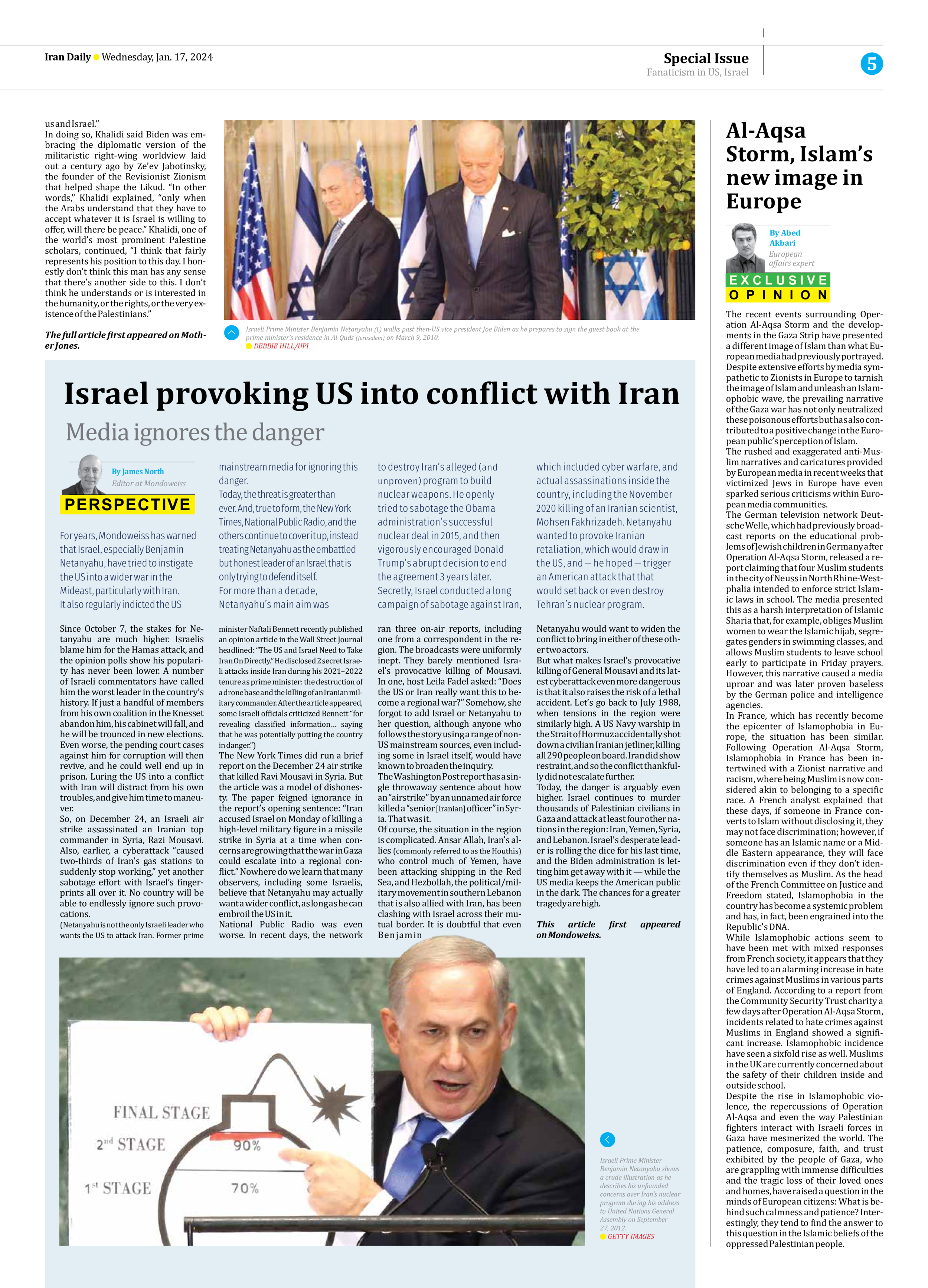
Israel provoking US into conflict with Iran
Media ignores the danger
By James North
Editor at Mondoweiss
For years, Mondoweiss has warned that Israel, especially Benjamin Netanyahu, have tried to instigate the US into a wider war in the Mideast, particularly with Iran. It also regularly indicted the US mainstream media for ignoring this danger.
Today, the threat is greater than ever. And, true to form, the New York Times, National Public Radio, and the others continue to cover it up, instead treating Netanyahu as the embattled but honest leader of an Israel that is only trying to defend itself.
For more than a decade, Netanyahu’s main aim was to destroy Iran’s alleged (and unproven) program to build nuclear weapons. He openly tried to sabotage the Obama administration’s successful nuclear deal in 2015, and then vigorously encouraged Donald Trump’s abrupt decision to end the agreement 3 years later. Secretly, Israel conducted a long campaign of sabotage against Iran, which included cyber warfare, and actual assassinations inside the country, including the November 2020 killing of an Iranian scientist, Mohsen Fakhrizadeh. Netanyahu wanted to provoke Iranian retaliation, which would draw in the US, and — he hoped — trigger an American attack that that would set back or even destroy Tehran’s nuclear program.
Since October 7, the stakes for Netanyahu are much higher. Israelis blame him for the Hamas attack, and the opinion polls show his popularity has never been lower. A number of Israeli commentators have called him the worst leader in the country’s history. If just a handful of members from his own coalition in the Knesset abandon him, his cabinet will fall, and he will be trounced in new elections. Even worse, the pending court cases against him for corruption will then revive, and he could well end up in prison. Luring the US into a conflict with Iran will distract from his own troubles, and give him time to maneuver.
So, on December 24, an Israeli air strike assassinated an Iranian top commander in Syria, Razi Mousavi. Also, earlier, a cyberattack “caused two-thirds of Iran’s gas stations to suddenly stop working,” yet another sabotage effort with Israel’s fingerprints all over it. No country will be able to endlessly ignore such provocations.
(Netanyahu is not the only Israeli leader who wants the US to attack Iran. Former prime minister Naftali Bennett recently published an opinion article in the Wall Street Journal headlined: “The US and Israel Need to Take Iran On Directly.” He disclosed 2 secret Israeli attacks inside Iran during his 2021–2022 tenure as prime minister: the destruction of a drone base and the killing of an Iranian military commander. After the article appeared, some Israeli officials criticized Bennett “for revealing classified information… saying that he was potentially putting the country in danger.”)
The New York Times did run a brief report on the December 24 air strike that killed Ravi Mousavi in Syria. But the article was a model of dishonesty. The paper feigned ignorance in the report’s opening sentence: “Iran accused Israel on Monday of killing a high-level military figure in a missile strike in Syria at a time when concerns are growing that the war in Gaza could escalate into a regional conflict.” Nowhere do we learn that many observers, including some Israelis, believe that Netanyahu may actually want a wider conflict, as long as he can embroil the US in it.
National Public Radio was even worse. In recent days, the network ran three on-air reports, including one from a correspondent in the region. The broadcasts were uniformly inept. They barely mentioned Israel’s provocative killing of Mousavi. In one, host Leila Fadel asked: “Does the US or Iran really want this to become a regional war?” Somehow, she forgot to add Israel or Netanyahu to her question, although anyone who follows the story using a range of non-US mainstream sources, even including some in Israel itself, would have known to broaden the inquiry.
The Washington Post report has a single throwaway sentence about how an “airstrike” by an unnamed air force killed a “senior [Iranian] officer” in Syria. That was it.
Of course, the situation in the region is complicated. Ansar Allah, Iran’s allies (commonly referred to as the Houthis) who control much of Yemen, have been attacking shipping in the Red Sea, and Hezbollah, the political/military movement in southern Lebanon that is also allied with Iran, has been clashing with Israel across their mutual border. It is doubtful that even Benjamin Netanyahu would want to widen the conflict to bring in either of these other two actors.
But what makes Israel’s provocative killing of General Mousavi and its latest cyberattack even more dangerous is that it also raises the risk of a lethal accident. Let’s go back to July 1988, when tensions in the region were similarly high. A US Navy warship in the Strait of Hormuz accidentally shot down a civilian Iranian jetliner, killing all 290 people on board. Iran did show restraint, and so the conflict thankfully did not escalate further.
Today, the danger is arguably even higher. Israel continues to murder thousands of Palestinian civilians in Gaza and attack at least four other nations in the region: Iran, Yemen, Syria, and Lebanon. Israel’s desperate leader is rolling the dice for his last time, and the Biden administration is letting him get away with it — while the US media keeps the American public in the dark. The chances for a greater tragedy are high.
This article first appeared
on Mondoweiss.







